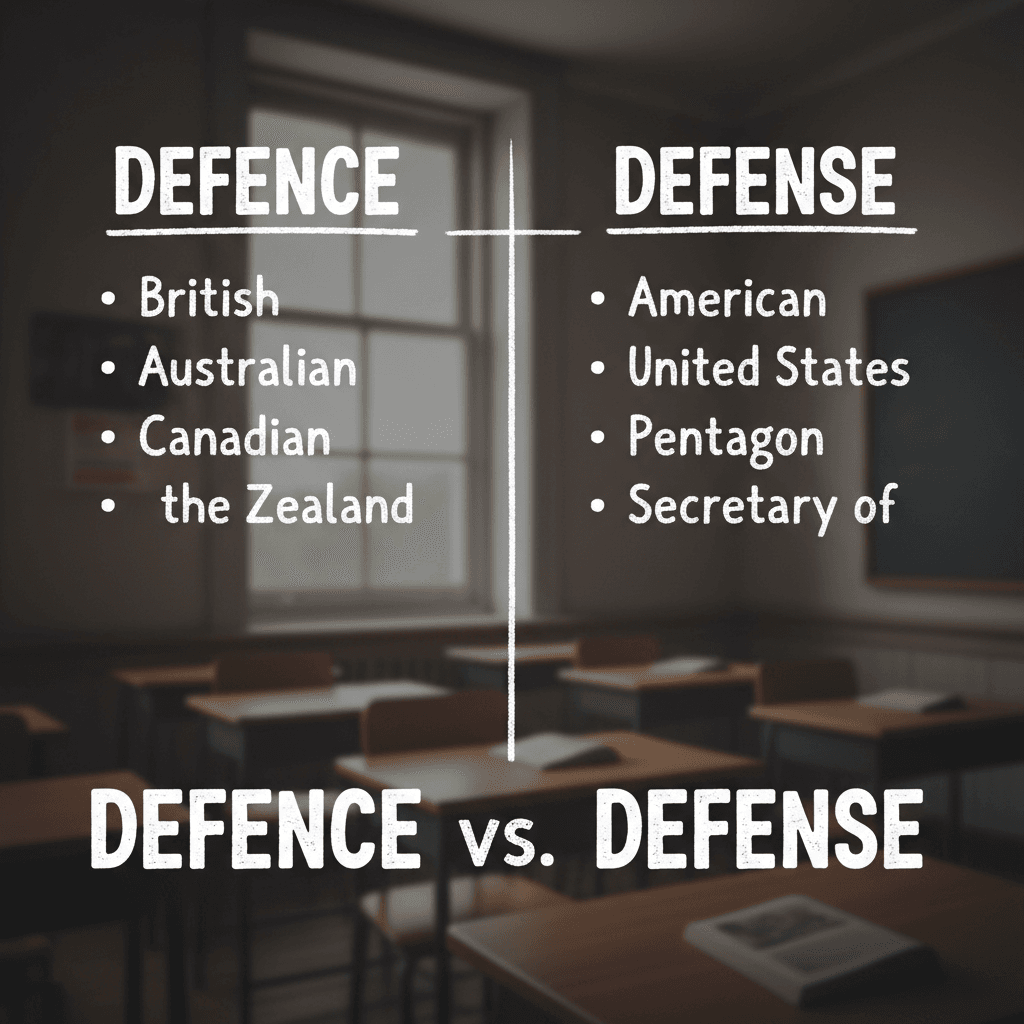Defence vs. Defense: What’s the Difference?
 Both defence and defense mean protection or guarding against attack, but they’re spelled differently in British and American English.
Both defence and defense mean protection or guarding against attack, but they’re spelled differently in British and American English.
Here’s the quick rule:
- Defence → British English
- Defense → American English
1. Defence: The British Spelling
Meaning
“Defence” is the preferred spelling in British English, used in the U.K., Australia, Canada, and other Commonwealth countries.
It means the act of protecting, justifying, or supporting something or someone.
Examples (10 total)
- The team’s defence was strong throughout the match.
- The lawyer spoke in defence of her client.
- The country increased its defence budget.
- Soldiers are trained for national defence.
- He made a passionate defence of his beliefs.
- The government focused on defence strategies.
- The castle’s walls provided excellent defence.
- She acted in self-defence when attacked.
- The new technology will improve air defence.
- The speech was seen as a defence of free speech.
🧠 Tip:
If you write “colour” or “centre,” use defence — it follows the same British spelling pattern.
2. Defense: The American Spelling
Meaning
“Defense” is the standard spelling in American English.
It has the exact same meanings and uses as defence, just with different regional spelling.
Examples (10 total)
- The football team’s defense played exceptionally well.
- The lawyer gave a strong defense of her client.
- The country’s defense system is highly advanced.
- He acted in self-defense when threatened.
- The speech was a defense of his political views.
- The military invested heavily in defense research.
- The U.S. Department of Defense oversees the armed forces.
- Good defense wins championships.
- The scientist gave a defense of his theory.
- The city built walls for defense against invaders.
🧠 Tip:
If you write “color” or “center,” use defense — the simpler American form.
3. Quick Comparison Table
| English Type | Correct Spelling | Example | Common Use |
|---|---|---|---|
| British English | Defence | The country improved its defence system. | Used in U.K., Australia, Canada |
| American English | Defense | The team’s defense was unbeatable. | Used in the U.S. |
4. How to Remember
👉 Defence = used in places with “British” spellings like colour, favourite, centre.
👉 Defense = used in places with “American” spellings like color, favorite, center.
💡 Memory Trick:
British = c (defence)
American = s (defense)
5. Common Mistakes
❌ The team’s defense was weak. (if writing in British English)
✅ The team’s defence was weak.
❌ The U.S. Department of Defence.
✅ The U.S. Department of Defense.
6. Why It’s Confusing
They sound identical and mean exactly the same thing, but the spelling difference follows each country’s language standards — just like realize/realise or analyze/analyse.
Grammar tools like Humanizey can automatically detect your language style and adjust regional spellings for consistency.
FAQs
1. Do “defence” and “defense” have the same pronunciation?
Yes — both are pronounced /dɪˈfɛns/.
2. Is “defence” a noun or verb?
It’s a noun. The verb form is defend, which is spelled the same everywhere.
3. Are there related words that also change spelling?
Yes.
- British: offence, licence, pretence
- American: offense, license, pretense
4. Which one should I use in academic writing?
Use the version that matches your target audience — defense for U.S. readers, defence for U.K. readers.
Practice: Choose the Correct Word (“Defence” or “Defense”)
(Answers are listed at the end.)
- The lawyer made a strong ___ of her client.
- The team’s ___ was almost impossible to break through.
- The country invested more in national ___.
- He acted in self-___.
- The castle walls were built for ___.
- The government’s ___ budget has increased.
- The speech was a ___ of human rights.
- She gave a detailed ___ of her research.
- The Department of ___ is based in Washington, D.C.
- The soldiers stood ready for ___.
Answers
For British English: defence
For American English: defense
